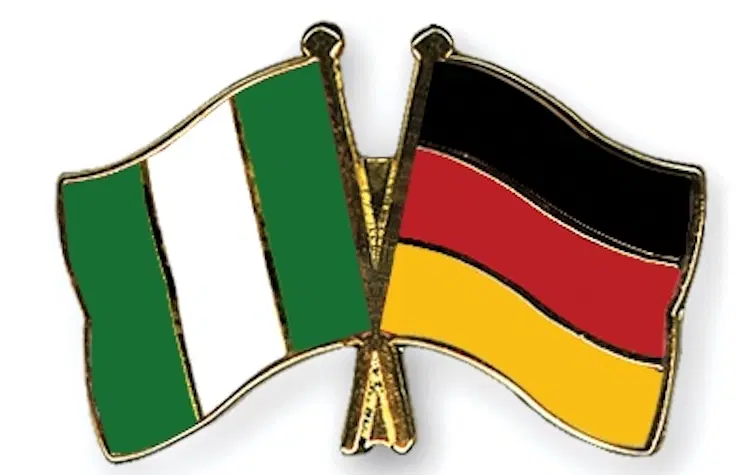‘Why trade volume between Nigeria, Germany is low’
The Chief Executive Officer of the Germany’s Giessen-Friedberg Chamber of Commerce and Industry, Dr Matthias Leder, has identified low labour productivity, high capital interest, innovation and illegal immigration as parts of bane underpinning international trade between Nigeria and Germany. To this end, he called for an improved foreign trade balance between Nigeria and the Republic […]

germany nigeria flags
The Chief Executive Officer of the Germany’s Giessen-Friedberg Chamber of Commerce and Industry, Dr Matthias Leder, has identified low labour productivity, high capital interest, innovation and illegal immigration as parts of bane underpinning international trade between Nigeria and Germany.
To this end, he called for an improved foreign trade balance between Nigeria and the Republic of Germany.
Lamenting the below 1% volume of trade between the two countries, he said both nations must put efforts in place to improve the situation for the benefit of the two countries.
He spoke at the opening of the 14th Gateway International Trade Fair, in Abeokuta.
- High rent: FCT residents cry out, seek heavy tax on unoccupied houses
- $700m sugar investment will end Nigeria’s importation – Dangote
He noted that the balance of trade between Germany and Africa, particularly Nigeria, compared to Brazil and Republic of China is very uneven.
Dr Leder said Germany does a lot of trading with Brazil and China but its volume of international trade with Africa is 2% out of which Nigeria is less than 1%, adding that his dream is to see that the trade between Germany and Nigeria grows.
Leder, who observed that international trade has always been a cornerstone of prosperity and development, stressed that Germany was poised to change the narrative of the trade imbalance that Nigeria is having with Germany.
He added that China’s investment in the last 20 years in Africa is much more than that of Europe as the country invested in infrastructure, rail, ports, telecommunications and so on, the German trade expert declared his country would work to close the gap in the balance of trade with Nigeria, which is the most populous black nation in the world.
Leder, however, identified low labour productivity, high capital interest, innovation and illegal immigration as parts of bane underpinning international trade between Nigeria and Germany.
“To change the narrative of the trade imbalance that Nigeria is having with Germany, you can improve the productivity of labour, you can improve the productivity of capital and innovation.
“We have this project called dual vocation training which means to improve the factor labour. These people received excellent practical training, these people easily find jobs in Europe and in Germany because the training includes working in a company for three days and spending two days in a vocational training school.
“These people who participated in the dual training are better off in the company where they work because they get to see their clients hailing their works. So, dual vocational training is one means of improving productivity,” he said.
The former Minister of Information and Culture, Lai Mohammed, said Nigeria should refrain from exporting raw materials but add values to them to make them exportable to the international market.
While noting that the country should take advantage of the regulatory bodies to meet up with the international standard, that former minister pointed out that, “Rather than exporting our cocoa, our gold, we need to set up factories that can help processing to give them more value before they are exported.”
The President of the National Chamber of Commerce, Industry Mine and Agriculture (NACCIMA), Dele Oye, disclosed that the chamber was already partnering with Germany to import some machines for agro processing, noting that, “Once you process your goods, the value you get is usually five times of the 1% you will have without processing”
He added that NACCIMA is also working with the Germans to have a skills centre in Nigeria where entrepreneurs in the country can be trained to improve skills, productivity and transfer of technology.
